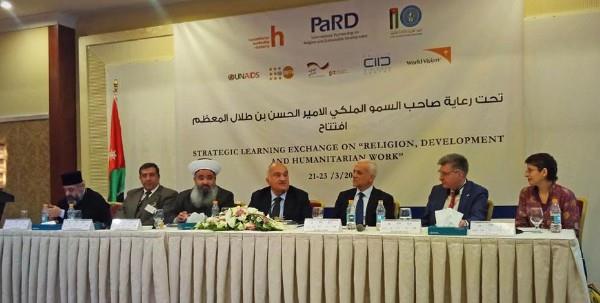
Religious leaders explore link between faith, development, humanitarian work
The meeting was held by the International Partnership on Religion and Sustainable Development, which aims to strengthen and leverage ongoing cooperation, in addition to facilitating new collaboration between religious and secular actors in international development.
During his inaugural speech, Prince Hassan stated: 'Faith implies a common denominator based in the values of those who believe in human dignity,' adding that 'humanitarian assistance should go beyond human rights, and human dignity must remain at the core'.In this regard, the prince stressed the need for a dialogue aimed at 'building understanding among institutions', calling for 'a regional policy based on the acceptance of our differences and the promotion of dignity of the identity no matter where we come from'.
In a video played during the inauguration ceremony, UNFPA Executive Director Natalia Kanem thanked Prince Hassan and all partners for their efforts and collaboration, noting that 'by working together, we can build a humanitarian faith-based engagement'.German Deputy Ambassador Ralf Schröer noted that 'religious values influence the thoughts and behaviours of everyone, and they are one of the most important components of the civil society.'
In this regard, Dar Al Ifta Grand Mufti Mohammad Khalayleh pointed out that 'civil society is in a way confronted by religion as if they were opposed concepts but, if we pay attention to history, we will realise that civil society and religion are not separated', adding that 'the greatness of Prophet Mohammad relies on his compassion and his ethics'.Syrian Bishop Elias Toume continued: 'The Bible teaches us that faith has to be proven with actions rather than just beliefs. It is the church's obligation and devotion to provide relief for the needy.'
The first session of the SLE focused on the added value of religion, faith-based organisations and religious communities, and the specific challenges posed by inter-linkages between faith and humanitarian work.A member of the audience raised the question of the links between religion and terrorism, to which the Prince responded 'Islam does not call for extremism, but they look at us as terrorists. What we are fighting against are the symbols of so-called Islamic terror, and we should use history as a prologue for a better future.'
The SLE is set to continue through Friday, with sessions on the intersections between faith and humanitarian work, and the actions that the UN and the government shall take to improve the partnership with a range of faith based actors when undertaking development and humanitarian work.

Legal Disclaimer:
MENAFN provides the
information “as is” without warranty of any kind. We do not accept
any responsibility or liability for the accuracy, content, images,
videos, licenses, completeness, legality, or reliability of the information
contained in this article. If you have any complaints or copyright
issues related to this article, kindly contact the provider above.
Most popular stories
Market Research

- Thinkmarkets Adds Synthetic Indices To Its Product Offering
- T-REX Launches Intelligence Layer To Fix Web3's Value Distribution Problem
- BTCC Exchange Maintains 143% Total Reserve Ratio In September 2025 Demonstrating Continued Financial Strength
- Ethereum-Based Defi Crypto Mutuum Finance (MUTM) Raises Over $16 Million With More Than 720M Tokens Sold
- Superiorstar Prosperity Group Russell Hawthorne Highlights New Machine Learning Risk Framework
- R0AR Chain Announces $100,000 Community Rewards For Creators, Yappers, And Brand Evangelists



















Comments
No comment